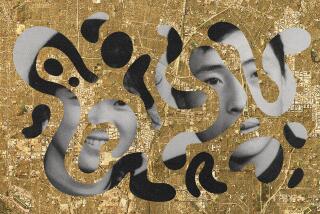Pooled Cash of Loan Clubs Key to Asian Immigrant Entrepreneurs
- Share via
Tom Chi’s first job in America was busing tables at a fancy restaurant. A few months later, at the age of 37, he was promoted to waiter. Chi, a Chinese immigrant, considered hard work and thriftiness second nature, but all the scrimping and saving and 15-hour shifts got him no closer to the dream of opening his own business.
So Chi did what countless other Asian newcomers in need of seed money have done: he turned to fellow immigrants and an underground banking system that has greased the wheels of Asian enterprise for centuries.
Called hui in Chinese, kye in Korean and tanomoshi in Japanese, private loan clubs have crossed the Pacific with only minor accommodations to a different time and culture.
Key to Business Prowess
Sociologists consider the clubs--in which members contribute to a kitty that is then given on a rotating basis to every member--among the most important factors behind the entrepreneurial prowess of Asian immigrants.
Many of the Mom and Pop bakeries, restaurants, grocery stores and boutiques that dot Chinatown, Koreatown and the Vietnamese business strips of the San Gabriel Valley, Orange County and elsewhere could not have opened or survived tough times without the pooled cash of a loan club, sociologists say.
The clubs, while not illegal, operate outside U.S. banking laws and safeguards. They offer high, sometimes usurious, rates of interest to those willing to put up the money and ready cash--ranging from a few hundred dollars to $20,000 and more--to those unable to obtain loans through conventional means.
There are no signatures, no documents, not even handshakes to seal the deal.
Instead, the concept--descended from villages where groups joined together to build a road or marry off a daughter--is based on trust and the certain disgrace that would accompany failure to pay a debt.
“Americans need lawyers and pages and pages of legal paper,” said Chi, 57, who opened Fortune Bakery in San Gabriel in 1985 using start-up capital from a hui . “But we believe in each other, no questions asked. They know the money won’t be going to Las Vegas.”
Amounts Involved Unknown
The subterranean nature of loan clubs makes it impossible to quantify their influence. Few members are willing to talk about their participation and even fewer want their names used. The interest earned from the transactions, members say, is rarely reported to the government.
But loan clubs are so entrenched in the Korean community, for example, that a leading Koreatown bank recently unveiled a savings and loan plan along the lines of a kye. A customer who agrees to save $1,000 a month for 10 months can, at the end of the third month, borrow $10,000. Paper work is limited.
Participation Widespread
In a 1987 study, Ivan Light, a UCLA sociology professor, found that 75% of the members of the Korean American Garment Industry Assn. belonged to or had a family member belonging to a kye . More than 36% said that at least part of their start-up capital came from a kye.
In the Korean community, the loan clubs are run by women, who by tradition manage the family’s finances.
Light, who has written extensively on the subject, credits loan clubs as one reason why Asians are more entrepreneurial than other groups.
“The loan club is a factor of consequence,” Light said. “It’s not trivial. It’s not an archaic institution by any means.”
At the Triple AAA Seafood restaurant in Monterey Park one recent evening, 10 men and two women gathered for a monthly meeting of their hui . All were ethnic Chinese refugees from Vietnam. All were friends or longtime acquaintances. All had been members of a previous club.
Before an elaborate table with pink napkins, they sat down to an eight-course meal that began with shark fin soup and ended with a sweet dish of white nuts and mashed taro. In between, the men toasted with cognac.
Must Cover Defaults
After the meal, the 11 members each handed over a $2,000 check to the hui master, the man who had organized the club and received the first $22,000 kitty free of interest. The master picks or clears all members and therefore must cover all defaults.
By this--the 11th meeting--all but two of the members had also taken home a pool. Unlike the master, however, they had to bid secretly on paper the amount of interest they were willing to pay. The highest bidder takes home the kitty for that month.
Tina Chau, one of the two members who had not yet collected a pool, explained that those needing immediate cash bid higher interest payments--$1,000 and up--in order to collect their pools in the early months.
Those who joined mostly as investors waited until the latter months before collecting their pools, all the while earning interest from the others.
In a problem-free loan club, Chau said, the ideal position is the last holdout. He or she can make $2,000 and more in interest earnings from the early winners. And when it comes time to collect the last pool, there is no one to bid against, so no interest to pay out.
On this evening, Chau and the other holdout agreed not to bid against each other but to split the remaining two $22,000 pools, both avoiding any interest payments.
‘This Is a Shortcut’
“We are new immigrants,” she said. “And this is a shortcut. You can get your money fast and you don’t have to go through all the hassles, listing your home, listing your assets on a bunch of paper. Chinese don’t always like to show what they have.”
While police rarely encounter loan clubs going bad in the Chinese and Japanese community, they receive frequent complaints about Koreatown kyes that have collapsed and left investors with thousands of dollars in losses.
Sang Han, a Korean officer assigned to the Los Angeles Police Department’s Asian Task Force, said Korean loan clubs are larger than their Chinese and Japanese counterparts, often bringing together 50 to 100 people with pools in excess of $400,000.
Many of these members do not know each other, thus weakening the social pressures that prevent members from defaulting.
In addition, many of the members are in such desperate financial shape that they are willing to pay $5,000 and $10,000 in interest to collect an early pot.
Han said a single person forced to drop out because of financial difficulties is sometimes enough to shake the group’s confidence and produce a domino effect.
Not Covered by State Law
“I get two calls a week from Koreans who say they have been ripped off in a kye ,” Han said. “But there are no laws in California that cover this.
“It’s not a pyramid scheme and to prove a crime has been committed you have to show that the master organized the kye with the intent to defraud. That’s real hard to do. I tell them to hire a lawyer and pursue it in civil court.”
Earlier this year, Han received numerous complaints from Korean immigrants who had joined loan clubs organized by Yong Sul Pak, owner of a Koreatown cosmetic firm.
According to police and reports in the Korean press, Pak had 25 different kyes in progress when she and her estranged husband suddenly left the state. Police say she may have pocketed more than $100,000 in cash. Korean newspaper accounts place the figure at between $2 million and $3 million.
Pak, who reportedly organized the kyes because a son had taken large sums of money from the family, was apparently able to fool the members because she rarely announced each month’s winner. Only when her clubs collapsed did members compare notes and discover that Pak herself had taken home most of the pools.
Many of the victims own boutiques and small businesses in a Koreatown shopping center where Pak ran San Ho Cosmetics. Not surprisingly, none wanted to talk about their involvement.
‘Lost More Than $25,000’
“Some people lost more than $25,000,” said a clerk at an electronics shop across from Pak’s abandoned store. “They are embarrassed to tell you about it.”
But despite cultural pressures to remain silent, a number of loan club creditors are pressing their claims in court. The most prominent case is taking place in San Francisco where 23 Korean immigrants have filed a class-action fraud suit to recover more than $250,000 lost in four kyes organized by Soon Duk Cabling, who has declared bankruptcy.
Early this month, a U.S. bankruptcy court judge ruled that Cabling, as a kye master, had an expressed obligation to collect the monthly deposits and cover the debts of members who had suddenly dropped out.
The judge refused to discharge Cabling from her debt.
“(Her) failure to perform properly the duties of the kye (master) constitutes both a breach of contract and a breach of common law duty of care,” the judge wrote.
Despite occasional problems, though, Light and others believe the rotating credit associations will remain an institution among Asian newcomers unable to turn elsewhere for instant capital.
Johnny Chuang lost his textile company in Vietnam during the Communist takeover in 1975. Since coming to America seven years ago, Chuang has built a lucrative business importing piquant fish sauces from Southeast Asia.
At Chuang’s first hui in America, he recalls, the members each contributed $200 and toasted their good fortune with Martell regular cognac ($23 a bottle).
These days, individual contributions are $2,000 and up and the members drink Martell Blue Ribbon ($60 a bottle).
“All of us lost everything we had in Vietnam,” said Chuang, who also manages and is part owner of several restaurants. “Now, helping each other, we are slowly building again.
“The next time we meet,” he said with a wide grin, “you may find us drinking Martell XO ($130 a bottle.)”
More to Read
Inside the business of entertainment
The Wide Shot brings you news, analysis and insights on everything from streaming wars to production — and what it all means for the future.
You may occasionally receive promotional content from the Los Angeles Times.










